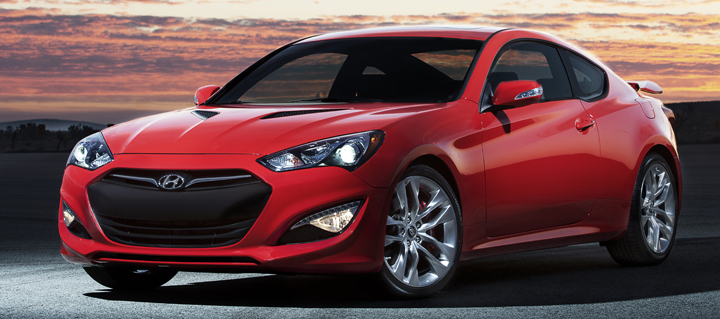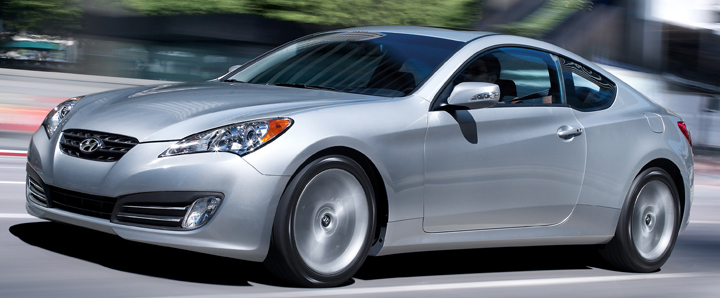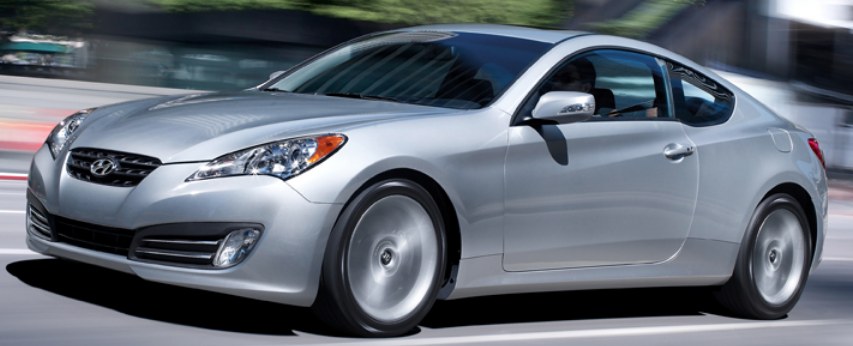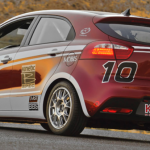
What essentially started out as an experiment to sell small, cheap cars built in South Korea has turned into an automotive empire. In a fairly short amount of time, Hyundai has gone from a joke in the minds of consumers and pundits to a major powerhouse whose products (in most segments anyway) are not to be missed.
It started when the company elected to extend its basic warranty to 5 years/60,000 miles from the industry standard 3/36,000. It instilled confidence in buyers. Follow that success with a rapid pace of new, redesigned, and freshened products, and consumers are walking into Hyundai dealerships with their pocketbooks open.
Now, Hyundai is attempting to tackle some more niche markets. They’re going upscale with their big Equus and Genesis sedans. They’re also going sporty with the Veloster and Genesis Coupe.
When the company rolled out the 2010 Genesis Coupe at the 2009 Chicago Auto Show, I was smitten. This was one of the best-looking cars I had seen in years. The look was purposeful, aggressive, and a clean break from the “retro” look of American sporty cars such as the Camaro, Challenger, and Mustang. Under the hood, you got a choice of a 210-horsepower 2.0-liter turbocharged 4-cylinder engine (Hyundai’s first such motor since the ill-fated Scoupe Turbo) or a 306-horsepower 3.8-liter V6. The car’s overall design and architecture made it ripe for aftermarket tuning; at the same time that the Genesis Coupe launched, Hyundai announced a partnership with drift-league racer Rhys Millen. Prices ranged from $22,000 to $32,000, with the brand’s excellent warranty included.
I wasn’t the only one struck by the Genesis Coupe. My colleague David Hall is a huge tuner-car aficionado, and when he saw it, he had to have one. He made that dream a reality, ordering a sharp-looking white Track model with the V6 engine and standard 6-speed manual transmission.
Alas, unless I were to win the lottery, my dream of owning the car would have to remain just that. Still, whenever we received a Genesis Coupe for testing purposes, I jumped at the chance to pilot one, if only for a few days. While I loved the car, it didn’t really love me back. The ride was pretty harsh and unsettled, and the manual transmission was no fun at all to drive. Moreover, I had a hard time finding a comfortable seating position, and the cabin décor was a bit on the cheap side—even for a car that was reasonably priced for the class. Still, none of that would have deterred me from buying one if I had the cash.
Fast forward to January 2012. Hyundai launched a freshened Genesis Coupe at the Detroit Auto Show. On paper, it appears to address the most voiced criticisms: improved suspension tuning, easier to drive manual, and nicer interior materials. In a nod to power junkies, both the 4-cylinder turbo and V6 motors get a major power boost: to 274 from 210 in the former and 348 from 306 in the latter. New 8-speed automatic transmission promises a boost to fuel economy.
On the road, I took a brief drive in a 2013 Genesis Coupe 2.0T with the automatic transmission. The extra horsepower makes the car feel much more lively, and the transmission does a great job of keeping the engine in an optimum power band. The ride and handling are much better than its 2010-2012 predecessor. The interior is more stylish and refined, not to mention more comfortable. A large part of that is due to a newly standard telescopic steering wheel.
However, I wouldn’t buy this car, and it’s for one reason: Hyundai ruined the styling. The designers took the shark-like front end and smacked it in the face with a giant pizza spatula. My colleague Mr. Hall says the grille looks like a boxer smiling with his mouth guard in place.
Some cars disappoint me because I think they do one or more things much more poorly than other vehicles in their respective classes. Some disappoint because they aren’t good values for the money. The 2013 Genesis Coupe could very well be one of the most disappointing cars I’ve ever driven, not because of the way it drives (it’s much, much better than the 2010-2012). The problem is it no longer looks the part—and like it or not, styling matters in this segment.
If the Genesis Coupe survives to a second generation, I hope Hyundai designers will bring back some of the magic and mystique of the original car.

Real-World Walk-around: 2018 Jeep Grand Cherokee Trackhawk



